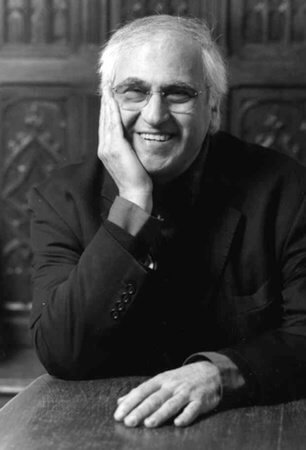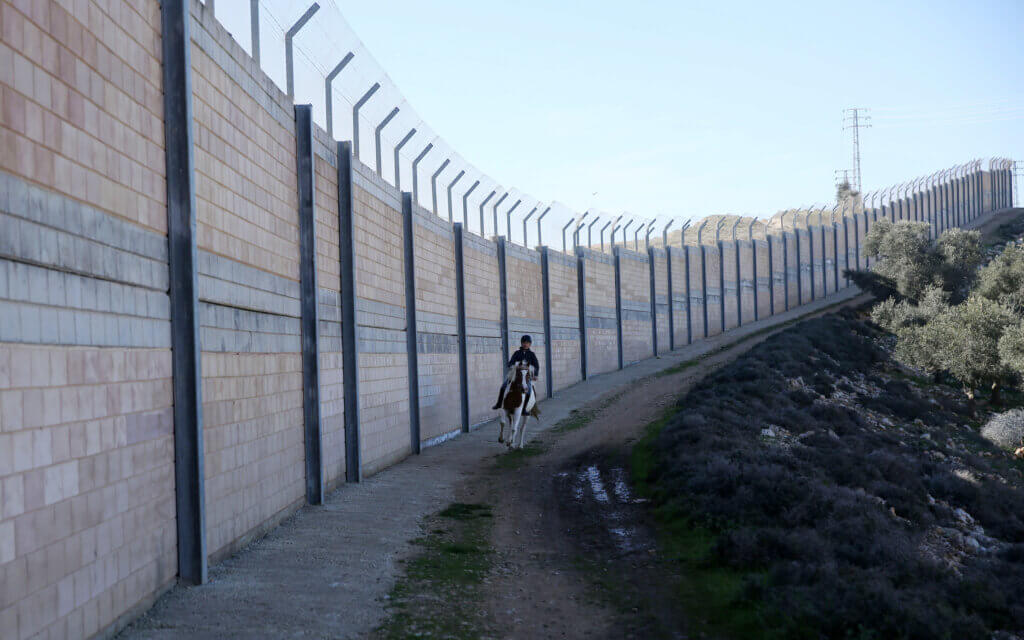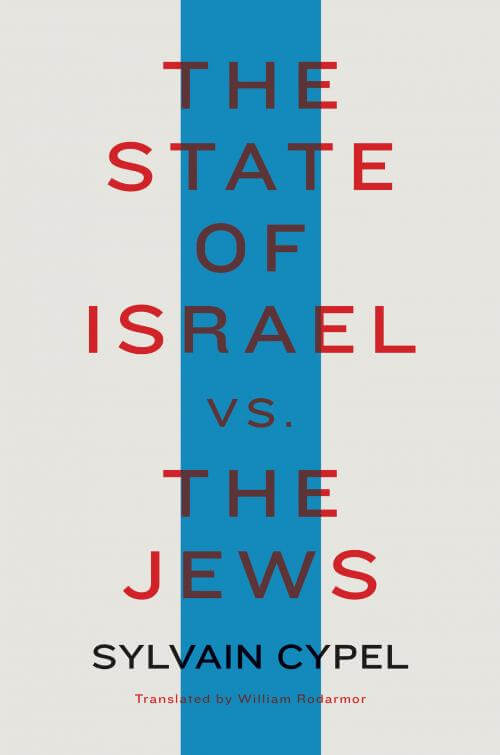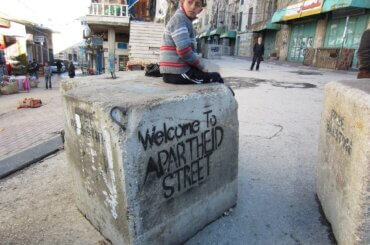THE STATE OF ISRAEL VS. THE JEWS
by Sylvain Cypel
360 pp. Other Press. $27.99
The iconic comedian Lenny Bruce had a bit contrasting what is considered “Jewish” and “goyish” that a friend and I would often riff on as Jewish socialists: “Socialism is Jewish, but Zionism is painfully goyish.” We were juxtaposing the internationalist, universalist yearnings for justice of the former with the racist, deeply European nationalism of the latter.
At its core, for better and for worse, Sylvain Cypel’s The State of Israel Vs. The Jews is a 300 page extended version of my friend’s joke, without the laughs. Cypel casts a light on the bitter conflict between the deeply nationalist, “forceful” Israeli Jews and the progressive Jews who still claim inspiration from those universalist values in both Israel and the United States.
In the book’s Introduction, Cypel goes in depth to describe the pre-Holocaust Jewish community’s affinities for Bundism and socialism- both as a means for liberation against antisemitism and in favor of values of social justice that have historically been inherent in the Jewish tradition. With the tragic extinguishment of Jewish bodies and ideologies during the horrors of the Shoah and Stalinism, the Israeli state was built, strengthened, and Zionist hegemony within the global Jewish community was established, which, as viewed by Cypel’s father Jacob, constituted a “victory”: a State of Israel as a real, tangible measure of security and accomplishment for a once-deeply oppressed people.
However, all is far from kosher in the self-proclaimed “Jewish” state. Cypel explores how, during his time living in Israel back in the 1960s, the Israeli Jews’ treatment towards the indigenous Palestinian Arabs mirrored eerily that of the genocidal French regime’s towards the Algerian Arabs: it was a “colonial” attitude that “astonished” him. He then describes his ensuing revelatory process that Israel’s expulsion of the Palestinian people during the Nakba was “deliberately brutal.” And post-1967, Cypel decries Israel as metamorphosing into “something no idealist could stomach: a racist, bullying little superpower”- a degradation he regards as largely complete by the time of this book’s publication in France in 2020 and in the United States, Fall 2021.
After such an introduction- both nuanced in its depiction of the Jewish people and filled with insightful, incisive, forensically-cited moral outrage to Zionism’s apartheidesque colonization of Palestine, this book’s virtues hardly end.
Cypel astutely articulates the unique aspects of Israel’s cruelty towards the Palestinians:
“It’s true that the occupation has never reached the levels of terror inflicted upon [Syria and Yemen], but three factors make it particularly oppressive: its initial basis (expelling people from their land by force); its long duration (seventy-plus years since that expulsion, fifty years of military occupation over most of those people); and finally, its modalities (the slow, but steady confiscation of land, the seizure of resources, the occupying authorities’ deliberate policy of making Palestinians daily lives unbearable in hopes of making them eventually leave).”
Frankly, in and of itself, this single (long) sentence justifies the whole book and makes it great.
Additionally, the titular conflict of the book is explored in a truly multifaceted manner. Cypel hopefully praises the phenomenon of growing American Jewish opposition to Netanyahu and the occupation of the West Bank and Gaza, as well as the building of anti-Zionist sentiment in groups like Jewish Voice for Peace. Furthermore, he also depicts not only the dissident activism of Israeli Jews in groups like Breaking the Silence and B’Tselem- but the Israeli security state suppressing said dissent, sacrificing integral civil liberties and, with the same legal and physical instruments weaponized against the Palestinians, harming Jews in the name of “national security.”

In addressing one aspect of his premise, Cypel manages to achieve something rather special: the occupation of the West Bank and Gaza has led to the growth of a massive military industrial- securitization complex within Israel- alongside, perhaps counterintuitively, fostering enormous internal trepidation over the long-term untenability of Zionism’s dominance over the Palestinians it has oppressed for such duration. That dominance has created for the Israelis an existence predicated on perpetual fear against a people they have colonized for merely having the temerity to live within their historic homeland, which in turn justifies them committing disproportionate and awe-generating violence against the Palestinians: Cypel notes in his introduction, “there are the deaths: 10 on one side, one on the other.” Since 2010, that figure is around 23 to one. He also quotes Haaretz journalist Amira Hass, who compares Israel’s wanton violence to an entire country undergoing the infamous Milgram obedience experiment, in which the Israelis, who largely approve or tolerate their government’s oppression of the Palestinians, are the true guinea pigs.
Few could encapsulate this reality as well as the recently departed Archbishop Desmond Tutu: “my concern is also what the Israelis are doing to themselves- they are not aware that when you carry out dehumanizing policies, those policies dehumanize the perpetrator.” Such is the moral and spiritual decay to which Israel subjects its own Jewish population.
And yes, Bubbe- yes Zaydie: it is “bad for the Jews.”
Cypel’s lament for Jewish values bizarrely parallels a chapter of one of my favorite novels, James Joyce’s Ulysses, when Leopold Bloom, the half-Jewish protagonist, gets into an argument in a Dublin bar with an antisemite who excoriates Jews for their alleged weakness. Bloom counters the bigotry by praising the Jewish mentality. “There’s no use for that. . .Force, hatred, history, all that. That’s not life for men and women, insult and hatred. . .And everybody knows that it’s the very opposite of that that is really life. Love, says Bloom. I mean the opposite of hatred” and goes on to describe the Jewish intellectual and spiritual traditions, from Jesus Christ to Karl Marx, that have shaped the modern world in greatness and compassion.
Cypel showcases a parallel battle, between Jews who see themselves, more or less, like Bloom and those who support the state of Israel’s colonization of the Palestinians. The Israeli state shares an eerie commonality with the antisemite in Ulysses: a rabid nationalism that desires destruction of those great traditions.
Cypel’s depth and breadth in relaying the grim reality of Israeli apartheid and its ominous effects for the global Jewish community results in this work being great- and even essential- but it cannot be declared flawless. Subtlety can be a virtue, but the egregiousness of the Palestinian plight coupled with the supreme complicity of the Western media and political establishment renders boldness an imperative. Sadly, there are times that Cypel loses his moral clarity.
For instance, the Haaretz journalist Gideon Levy is quoted for sarcastically embracing the anti-Arab piece of legislation, the Jewish Nation State Law of 2018, as officializing an always-present oppression. Cypel critiques Levy, positing that the law “enshrines the triumph of ethnocracy.” Virtually in the same breath, Cypel notes that “the new law doesn’t change much before its passage”: indeed, ethnocracy already appeared quite irrevocably “enshrine[d].” Well, which is it?
One of the most important chapters in Cypel’s book is entitled “Pissing from the Diving Board.” This is an Israeli idiom meaning to engage in uncouth behavior in a brazen manner– rather than merely urinating in the pool while swimming. Cypel uses it to make a case that during the Nakba, Israel’s ethnic cleansing of the Palestinians was hidden and a subject to shame, while now, during the ethnic cleansing of Al-Naqab and Sheikh Jarrah, the racism is publicly embraced.
However, as to moral clarity, there remains an obvious question: if the Palestinians are enduring atrocities either way- and have been for well over seven decades at the hands of Zionism, as Cypel documents– What does it matter to them that it’s from the diving board?
Cypel also makes a point to contrast the American Jewish community, which he argues is more liberal and open to dissent, with the far more conservative French Jewish community. Although he praises the former for standing up to Netanyahu’s outright anti-Palestinianism, he scarcely investigates the contradictions of the particular actors he mentions. For instance, right alongside the anti-Zionist, pro-BDS group Jewish Voice for Peace, Cypel lauds the liberal Zionist group J Street for helming a trip, entitled Let My People Know, to occupied Hebron for young Jews. He doesn’t bother to mention that J Street has strong ties to the Zionist regime that Cypel does such an excellent job of demonstrating commits the crime of apartheid against the Palestinians. J Street has introduced U.S. congressmembers to Prime Minister Naftali Bennett, who is expanding West Bank settlements and illegally evicting Palestinians, and it has thrown internationally-respected Palestinian human rights organizations under the bus after the regime accused them, without disclosing evidence, of “terrorism.” Unsurprisingly, J Street altogether denies the nature of Israel constituting an apartheid regime, in contrast to much of the Israeli human rights community.
To illustrate the American Jewish community’s more open nature vis-a-vis the French, Cypel notes how many American Jews and American Jewish organizations are uncomfortable with laws being enacted against BDS– Boycotts, Divestment and Sanctions- while French Jews and their rather monopolistic organizational body are almost unanimously in favor. Nevertheless, when Israel’s crimes are as many and flagrant as they are, if one is actually a genuine progressive humanitarian, then the option is not merely to stand neutral on a moving train (to use the words of the great Jewish, pro-Palestine progressive Howard Zinn) but to actively favor BDS, which as Cypel does acknowledge, feels like a last resort for that community.
This is not to say that there haven’t been pro-Palestine developments in the American Jewish community that are worth celebrating, but Cypel’s analysis of the anti-Netanyahu wing of Jewish life paints the picture of a virtuous broad tent united in their opposition to racism. Instead, what actually exists is a hodgepodge of intercommunal bickering, toothless fingerwagging, and hand-wringing– and this against an ever growing backdrop of Jewish only roads, deliberate bombings of civilian infrastructure and Associated Press offices, siege warfare, home demolitions and colonial settlements, to cite just a handful of the atrocities meticulously outlined in this book to which Israel has subjected the Palestinians.
Cypel’s nuanced, albeit still positive, take on the Palestinian-led BDS campaign, includes his description of its “track record” as “spotty.” He does not apply that tenor to Jewish Zionist organizations that while opposing Netanyahu specifically, carry water for an apartheid regime- and for Zionism, an ideology that he repeatedly implies, if not outright states, is, was and always has been fundamentally colonialist and racist.
This illustrates the book’s biggest shortcoming: it rarely treats the Palestinian and Arab people as autonomous political actors in their own right for the necessity of their own freedom vis a vis Israeli and Diaspora Jews, even if all they do barely parses what could be considered the bare minimum. While the Jews who reject and resist Israel’s apartheid most certainly deserve praise and credit, then why don’t the Palestinians?
Regrettably, the Palestinians’ dimension and contours as a people are left fairly unexamined in this work. As a particularly interesting example, while there is a whole chapter rightfully excoriating Netanyahu for revising the Holocaust to blame in a bold faced lie the (deeply antisemitic and reactionary, but, at the time, exiled) Grand Mufti Amin Al-Huseyni for inspiring Hitler to instigate the Holocaust in 1941 (Jews were already being sent to death camps at that point), Cypel doesn’t note that, according to a recent Tel Aviv University analysis, around 14,000 Palestinian Arabs fought with the British against Nazism and, as Gilbert Achcar writes, the Arab people as a whole fought far more with the British than the Nazis.
Cypel seldom mentions any Palestinian organizing of any kind in favor of the liberation of their people, other than describing Palestinian people collectively as “divided,” offering that mixed analysis on BDS, and briefly mentioning Hamas’ actions during June of 2021 in the conclusion of the book.
Sadly, this has the effect of unintentionally rendering the Palestinian people closer to a backdrop in a story of their oppression- objects of liberal charity- rather than fully fledged human beings with their own nationalisms, desires, hopes, fears and dreams.
It is a glaring blind spot that perhaps is a microcosm of the “progressive liberal” Jewish community’s tragic flaw: their egotism. I swear, someone should bake some psilocybin cubensis into the challah at these synagogues – maybe that would change this attitude.
While The State of Israel Vs. The Jews is hardly a perfect work, it is a great one for its overarching lesson. As Cypel amply demonstrates, while it may have a “Jewish” ethno-religious majority, the State of Israel’s meanspirited, draconian brutalization of the Palestinian people constitutes a parodic blaspheme of Judaism’s highest intellectual, spiritual, and moral values, in a manner that harms both Palestinians and Jews. Towards the end of the book, Cypel includes a quote of Jewish scholar of religion and Berkley Professor of the Culture of the Talmud, Daniel Boyarin, “more piercing to me is the pain of watching a tradition, my Judaism, to which I have dedicated my life, disintegrating before my eyes. . .It has been said by many Christians that Christianity died at Auschwitz, Treblinka and Sobibor. I fear- God forbid- that my Judaism may be dying at Nablus, Dheisheh, Betein [Beit El] or El Khalil [Hebron].” Ultimately, Cypel succeeds in showing that the Judaism of Boyarin and Leopold Bloom still lives; if it continues to do so, or even flourishes, he will deserve some credit.
See Robert Herbst review of this book.




“Israel vs the Jews” is reviewed by David Shulman (professor emeritus at the Hebrew University and winner of the Israel Prize for Religious Studies) in the latest New York Review of books – you can only get the first paragraphs if you’re not a subscriber:
https://www.nybooks.com/articles/2022/02/10/lost-illusions-israel-palestine-david-shulman/
Shulman is on the ground observing apartheid first hand – here’s the last paragraph of his review:
“What we can say is that the Israeli side is still, after fifty-five years, maintaining in the Palestinian territories a system that ruthlessly causes the death or wounding of innocents in large numbers, just as it continues to steal more and more Palestinian land with the backing of the Israeli courts. It would also be fair to say that the situation is deteriorating from day to day. Those who know that situation firsthand also know there is no possible way to justify it or to make sense of it without resorting to the claim that eternal Israeli supremacy over the Palestinians is a worthy and attainable aim.”
1 of 2
Let us not forget that during the late 19th & early 20th centuries Zionists were planning the dispossession & expulsion of the indigenous Palestinians:
Herzl’s diary entry for September 3, 1898: ‘Were I to sum up the Basel Congress in a word which I shall guard against pronouncing publicly it would be this: at Basel I founded the Jewish state. If I said this out loud today, I would be answered by universal laughter. Perhaps in five years & certainly in fifty, everyone will know it.’ (David Hirst, The Gun & the Olive Branch, p. 20)
On 18 October 1898, Herzl met with Kaiser Wilhelm II in Istanbul & offered to provide Germany with a considerable sum in exchange for its support for the Zionist agenda in Palestine. He also assured the Kaiser that Palestine would be ‘an outpost of German culture if it were a Jewish Palestine.’ (ibid) The Kaiser rejected Herzl’s offer.
Even more revealing as to how Herzl & his fellow Zionists intended to deal with Palestinians is the “Charter for Zionist Colonization of Palestine & Syria” which he drafted between 1901 & early 1902. Much to his disappointment he was denied the opportunity to present it to the Ottoman Sultanate. Article Vl of the charter called for Istanbul to grant the Zionists, in the form of the Jewish-Ottoman Land Company (JOLC), ‘complete autonomy, guaranteed by the Ottoman Empire’ while Article III gave them in effect the right to deport the native population to other areas of the empire.
Israel Zangwill, the influential Anglo-Jewish essayist & Zionist first believed that the Palestinians would simply ‘fold their tents & slip away.’ It was he who first voiced the lie that Palestine was a ‘land without a people, waiting for a people without a land.’ (Zangwill, Israel, “The Return to Palestine”, New Liberal Review 11, Dec. 1901 p 627).
In 1905, Zangwill contradicted himself during a talk in Manchester when he observed that Palestine was ‘already twice as thickly populated as the United States….[W]e must be prepared to either drive out by the sword the [Arab] tribes in possession as our forefathers did or to grapple with the problem of a large alien population….’ (Zangwill, Speeches, p. 210, Nur Masalah, Expulsion of the Palestinians, p. 10) (cont’d)
2 of 2
In May 1911, Arthur Ruppin, one of early Zionism’s leading figures proposed to the Executive of the Zionist Organization, a ‘population transfer’ of the Arab peasants from Palestine.
In 1918, Polish born David Ben-Gurion described the future borders of the Jewish state as: ‘to the north, the Litani River; to the northeast, the Wadi’Owja, twenty miles south of Damascus; the southern border will be mobile & pushed into the Sinai at least up to Wadi al-Arish; & to the east, the Syrian Desert, including the furthest edge of Transjordan.” (Teveth, Ben-Gurion and the Palestinian Arabs)
In the February 1919 issue of the League of Nations Journal, Zangwill proposed that the Palestinians should be ‘transplanted’ in Arab countries & at a public meeting in the same year he remarked that ‘many are semi-nomad, they have given nothing to Palestine and are not entitled to the rules of democracy.” (Jewish Chronicle, Dec. 12 1919).
In 1937, the Jewish Agency’s Transfer Committee was established by Yosef Weitz & others. Its purpose was to devise a plan that would lead to the transfer’ of the Arab population out of Palestine so that Jews would become a large majority. This would be accomplished by ‘promoting measures designed to encourage the Arab flight.’ Weitz did not mince his words: ‘…there is no room for both people together in this country….The only solution is a Palestine…without Arabs. And there is no way other than to transfer the Arabs from here to the neighboring countries, to transfer all of them; not one village, not one tribe, should be left.’ (Yosef Weitz, My Diary & Letters to the Children, 1965.)
During a meeting of the Jewish Agency Executive on 12 June 1938, Ben-Gurion again advocated expulsion of the Palestinians: ‘I support compulsory transfer. I don’t see in it anything immoral.’ (Benny Morris, “Refabricating 1948”)
I’ve read it. It’s excellent. It’s true that it doesn’t talk much about the Palestinians – but that is criticizing it for not being a different book, which is an unfair criticism.